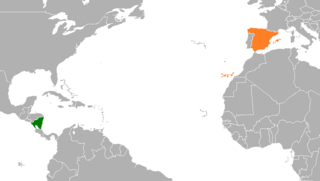Iran | Nicaragua |
|---|---|
Iran and Nicaragua established diplomatic relations on 19 April 1976. [1] Iran has an embassy in Managua and Nicaragua has an embassy in Tehran.
Iran | Nicaragua |
|---|---|
Iran and Nicaragua established diplomatic relations on 19 April 1976. [1] Iran has an embassy in Managua and Nicaragua has an embassy in Tehran.
In 2023, Iran and Nicaragua held discussions about bolstering their military cooperation as a way of countering American influence in Latin America, according to an intelligence update contained in a cache of leaked documents that appears to be based on electronic intercepts gathered by the C.I.A. [2]

Cuba's foreign policy has been fluid throughout history depending on world events and other variables, including relations with the United States. Without massive Soviet subsidies and its primary trading partner, Cuba became increasingly isolated in the late 1980s and early 1990s after the fall of the USSR and the end of the Cold War, but Cuba opened up more with the rest of the world again starting in the late 1990s when they have since entered bilateral co-operation with several South American countries, most notably Venezuela and Bolivia beginning in the late 1990s, especially after the Venezuela election of Hugo Chávez in 1999, who became a staunch ally of Castro's Cuba. The United States used to stick to a policy of isolating Cuba until December 2014, when Barack Obama announced a new policy of diplomatic and economic engagement. The European Union accuses Cuba of "continuing flagrant violation of human rights and fundamental freedoms". Cuba has developed a growing relationship with the People's Republic of China and Russia. Cuba provided civilian assistance workers – principally medical – to more than 20 countries. More than one million exiles have escaped to foreign countries. Cuba's present foreign minister is Bruno Rodríguez Parrilla.

Nicaragua pursues an independent foreign policy. A participant of the Central American Security Commission, Nicaragua also has taken a leading role in pressing for regional demilitarization and peaceful settlement of disputes within states in the region.

The Islamic Republic of Pakistan maintains a large network of diplomatic relations across the world. Pakistan is the second largest Muslim-majority country in terms of population and is the only Muslim majority nation to have possession of nuclear weapons.

The foreign relations of Iran are the economic and diplomatic relationships between the Iranian government and governments of other countries. Geography is a very significant factor in informing Iran's foreign policy. Following the 1979 Iranian Revolution, the newly formed Islamic Republic, under the leadership of Ayatollah Khomeini, dramatically reversed the pro-American foreign policy of the last Shah of Iran Mohammad Reza Pahlavi. Since then the country's policies have oscillated between the two opposing tendencies of revolutionary ardour to eliminate Western and non-Muslim influences while promoting the Islamic revolution abroad, and pragmatism, which would advance economic development and normalization of relations. Iran's bilateral dealings are accordingly sometimes confused and contradictory.

Foreign relations of Israel refers to diplomatic and trade relations between Israel and other countries around the world. Israel has diplomatic ties with 164 of the other 192 UN member states as of December 2020. Israel is a member of the United Nations (UN) and a number of other international organisations. Israel maintains full diplomatic relations with two of its Arab neighbours, Egypt and Jordan, after signing peace treaties in 1979 and 1994 respectively. In 2020, Israel signed agreements establishing diplomatic relations with four Arab League countries, Bahrain, the United Arab Emirates, Sudan and Morocco. As of 2021, Israel had formal diplomatic relations with 168 other countries, while twenty-eight UN member states have either never established, or have broken off diplomatic relations with Israel.

Denmark–Nicaragua relations refers to the bilateral relationship between Denmark and Nicaragua. Denmark is accredited to Nicaragua from its embassy in Mexico City, Mexico. Nicaragua is accredited to Denmark from its embassy in Helsinki, Finland. The relations are described as good. Nicaragua is a Danish programme country since 1993.

Mexico–Nicaragua relations are the diplomatic relations between Mexico and Nicaragua. Both nations are members of the Association of Caribbean States, Community of Latin American and Caribbean States, Organization of American States, Organization of Ibero-American States and the United Nations.

India-Nicaragua relations are the bilateral relations between India and Nicaragua. Relations have been limited to Central American Integration System dialogue and visits by Nicaraguan Ministers to India. India maintains an honorary consul general in Nicaragua, concurrently accredited to the Indian embassy in Panama City and Nicaragua used to maintain an embassy in India. It was reduced to an honorary consulate general in New Delhi. Nicaragua supports India's candidatures for UN bodies and international organizations. This includes the International Maritime Organization, Universal Postal Union, ECOSOC committees, UN ECOSOC, UNESCO's ICH, ICPO-Interpol, and UNSC non-permanent membership.

Nicaragua–Spain relations are the diplomatic relations between Nicaragua and Spain. Both nations are members of the Association of Academies of the Spanish Language and the Organization of Ibero-American States.

Nicaragua–Turkey relations are the foreign relations between Nicaragua and Turkey. The Turkish Embassy in San José, Costa Rica is accredited to Nicaragua while Nicaragua's Embassy in Berlin, Germany is accredited to Turkey.